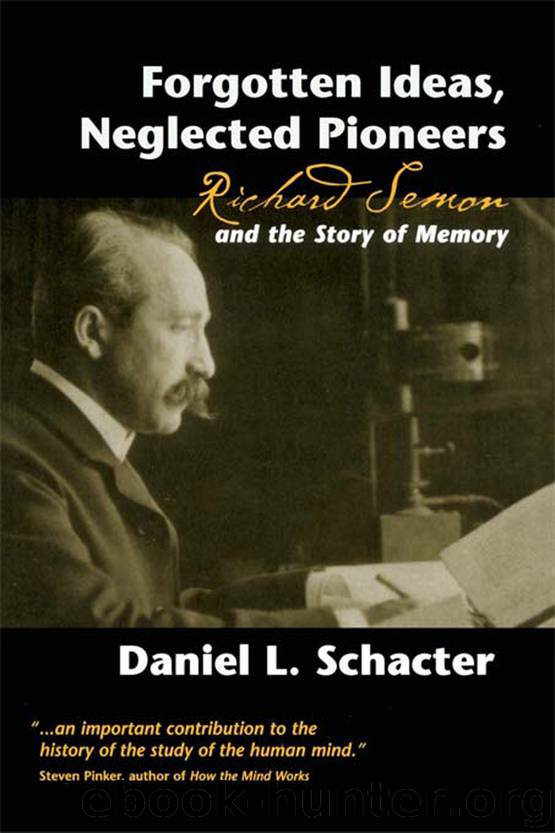Forgotten Ideas, Neglected Pioneers by Schacter Daniel L

Author:Schacter, Daniel L.
Language: eng
Format: epub
Publisher: Taylor and Francis
VOICES IN THE WILDERNESS
Thus far in the chapter I have attempted to document a theoretical neglect of retrieval phenomena in Semon's era and examine several possible reasons for it. I now close the chapter by considering several heretics of Semon's time who did focus theoretical attention on retrieval phenomena. In the context of our previous observations, we will find that these iconoclasts shared two features. First, they were not working in the mainstream experimental field of memory that was dominated by the work of Ebbinghaus and Müller. Second, they were either sharp critics of the associative doctrine or they worked on problems that were unrelated to the principal theoretical concerns of associationism.
It seems appropriate—and somehow inevitable—to begin by mentioning a name that is difficult to exclude from any consideration of revolutionary psychological thinking: Sigmund Freud. Freud is of interest to us insofar as he took the strong position that failures of memory are at root failures of retrieval. Freud's proposed mechanism of retrieval failure was, of course, embedded in his theory of repression. When retrieval fails, contended Freud, it is because the threat of affectively unpleasant experiences contained in, or related to, the sought after memory generates a “protective” response by the unconscious—that is, a repression of the threatening memory. Freud's application of his theory to mnemonic phenomena is well illustrated in his 1901 The Psychopathology of Everyday Life. Here he subjected numerous cases of everyday forgetting to psychoanalytic scrutiny and concluded that each one could be best understood as a retrieval failure caused by the inhibitory effects of repression. Consider his conclusion regarding the forgetting of proper names: “The mechanism of names being forgotten…consists in the interference with the intended reproduction of the name by an alien train of thought which is not at the time conscious (1960, pp. 39–40).” He drew a similar conclusion with respect to the forgetting of ‘impressions and knowledge’: “in every case the forgetting turned out to be based on a motive ofunpleasure (p. 136).” But Freud's primary interest centered on repression and not retrieval; retrieval was interesting to the extent that it represented a locus of repression. Even in his most ambitious attempt to construct a theory of memory (see Pribram & Gill, 1976), Freud did not expand his views on retrieval in a systematic fashion.
There was, however, a contemporary psychiatrist who took a much stronger interest in retrieval phenomena than Freud did. Although he is barely known to most modern experimental psychologists, Morton Prince (1916) elaborated revolutionary views concerning the importance of retrieval conditions that merit close attention even today. Prince, who advocated a dissociationist interpretation of subconscious phenomena (see Hilgard, 1977), specifically criticized the “older psychology” for ducking the problem of retrieval: “It did not concern itself with the process by which memory is effected (p. 7).” Prince specifically distinguished between registration, conservation, and reproduction as component stages of memory, and argued that it is more fruitful to approach memory as a process rather than as a “phase of consciousness” or “mental experience” (p.
Download
This site does not store any files on its server. We only index and link to content provided by other sites. Please contact the content providers to delete copyright contents if any and email us, we'll remove relevant links or contents immediately.
The Art of Thinking Clearly by Rolf Dobelli(8842)
Mindhunter: Inside the FBI's Elite Serial Crime Unit by John E. Douglas & Mark Olshaker(7834)
Change Your Questions, Change Your Life by Marilee Adams(6641)
Nudge - Improving Decisions about Health, Wealth, and Happiness by Thaler Sunstein(6633)
Mastermind: How to Think Like Sherlock Holmes by Maria Konnikova(6236)
The Power of Now: A Guide to Spiritual Enlightenment by Eckhart Tolle(4755)
Men In Love by Nancy Friday(4324)
Factfulness: Ten Reasons We're Wrong About the World – and Why Things Are Better Than You Think by Hans Rosling(4021)
The Confidence Code by Katty Kay(3566)
Thinking in Bets by Annie Duke(3531)
Man and His Symbols by Carl Gustav Jung(3315)
Three Women by Lisa Taddeo(2920)
The Worm at the Core by Sheldon Solomon(2917)
Why Buddhism is True by Robert Wright(2826)
Liar's Poker by Michael Lewis(2812)
The Inner Life of Animals by Peter Wohlleben(2766)
Descartes' Error by Antonio Damasio(2731)
The Power of Mindful Learning by Ellen J. Langer(2710)
The Slow Fix: Solve Problems, Work Smarter, and Live Better In a World Addicted to Speed by Carl Honore(2574)
